

|
| articles | forbidden stories I-State Lines resources my hidden history reviews | home | ||

Writing/Film Hot off the press! Dear Aspiring Writers: The Worst Advice You'll Ever Read Don't Write for Readers, Just Write Grants Ernest Lehman, Screenwriter Central Casting, Dept. of Acceptable EVil Tinseltown Tags Titles from Bard When Empire Was Easy: Around the World in 80 Days Trois Colours: White Spirited Away: Decay and Renewal Suzhou River Blue: Love and Loss The Nelson Touch Running On Empty "It's all about oil, isn't it?" American Identity Hapas: The New America Can You Tell What I am? Part I Can You Tell What I am? Part II Only in America Self-Reliance Unfolding Crises: Asia China: An Interim Report Shanghai Postcard 2004 Japan's Runaway Debt Train Will Avian Flu Trigger a Global Depression? China and India: Five Flies in the Ointment China & the U.S.: Circle of Self-Interest China Trade Surplus: Gusher Profits for U.S. Air Pollution and China's Future China: What a difference 27 years makes China Irony: Steel, Marx & Capital Is Japan's Recovery Sustainable? Corruption and Avian Flu: China's Dynamic Duo Exporting the Real Estate Bubble to China Battle for the Soul of America Katrina, Vietnam, Iraq: National Purpose, National Sacrifice The End of Empire is Real Simple A Degree of Success Why the Democrats Keep Losing American Chickenhawks: Your Congress Is This a Nation at War? A Nation in Denial Hawaii National Guard: An Unfair Deployment The Great Karmic Unraveling This is not Vietnam American Dream or American Nightmare? Why Is This Such a Tepid Time? Bringing the War Home The False Gods of Consumerism That Price Isn't Cheap, It's Subsidized U.S. Fascists Seek Ban on Cancer Vaccine Planetary Meltdown Watch The Immensity of Global Warming Financial Meltdown Watch What This Country Needs Is a... Good Recession Are We Entering the Next Age of Turmoil? Housing Bubble? What Bubble? Housing Bubble II Housing Bubble III: Pop! Meltdown in the E.U. Meltdown: U.S. - China Retirees: the New Elite? Boomers: Prepare to Fall on Your Swords The Real Federal Deficit The Word of the Decade: Gold The C.I.A., Oil and the Wisdom of Crowds Katrina's Long-Term Effects Catalyzing the Great Unraveling Welcome to 1935 Meltdown in the Making Is Risk Eliminated, or Merely Increased? Adios, O Bogus Prosperity The Flutter of a Butterfly's Wings? A One-Two Punch to a Glass Jaw Doubling Down on 5-Card No-See-Um Greenspan & The Conundrum Effect Why are we in this handbasket? Stock Market Tea Leaves The Scandals Yet to Come A Rickety Global House of Cards Hidden Costs of the Housing Bubble Are Japan and Germany Truly on the Mend? Unprecedented Risk 2 October Crash Redux Five Good Things About Recession Clear Skies or Storm Clouds? Zero Savings and Rising Retail Sales Foreigners Buy U.S. Debt--A Vicious Cycle Could One Rogue Trader Bring Down the Market? Oil/Energy Crises Whither Oil? How much Is a Gallon of Gas Worth? The End of Cheap Oil Natural Gas, Naturally High Arab Oil Money and U.S. Treasuries: Quid Pro Quo? Outside the Box How to Make a Favicon Asian Emoticons In Memoriam: Winky Cosmos The Wheeled Vagabonds In a Humorous Vein If Only Writers Had Uniforms Opening the Kimono One-Word Titles Complacency Nostalgia Praxis Keys to Affordable Housing U.S. Conservation & China Steve Toma, Me & Skil 77s: 30 years of Labor Real Science in the Bolivian Forest Deforestation and Sustainable Forestry The Solar Economy (book) The Problem with Techno-Fixes I Love Technology, I Hate Technology Health, Wealth & Demographics Beauty of the Augmented (Korean) Kind Demographics and War The Healthiest Cold Cereal: Surprise! 900 Miles to the Gallon Are Our Cities Making Us Fat? One Serving of Deception Is Obesity an Inflammatory Response? Demographics & National Bankruptcy Landscapes Selling the Landscape The Downside of Density Building Heights and Arboral Roots Terroir: France & California L.A.: It's About Cheap Oil The Last Redwood Airport Walkabouts Nourishment The French Village Bakery Ideas What Is Happiness? Our Education System: a Factory Metaphor? Understanding Globalization: Braudel Can You Create Creativity? Do Average People Know More Than Their Leaders? On The Impermanence of Work Flattening the Knowledge Curve: The "Googling" Effect Human Bandwidth and Knowledge Iraqi Guangxi Splogs, Blogs and "News" History The Strolling Bones: Rock of Ages Bad Karma: Election Fraud 1960 Hiroshima: First Use All the Tea in China, All the Ginseng in America Essential Books The Misbehavior of Markets Boiling Point (Global Warming) Our Stolen Future: How We Are Threatening Our Fertility, Intelligence and Survival How We Know What Isn't So Fewer: How the New Demography of Depopulation Will Shape Our Future The Coming Generational Storm: What You Need to Know about America's Economic Future The Third Chimpanzee: The Evolution and Future of the Human Animal Beyond Oil: The View from Hubbert's Peak The Party's Over: Oil, War and the Fate of Industrial Societies The Solar Economy: Renewable Energy for a Sustainable Global Future The Dollar Crisis: Causes, Consequences, Cures Running On Empty: How The Democratic and Republican Parties Are Bankrupting Our Future and What Americans Can Do About It More book reviews Archives: weblog November 2005 weblog October 2005 weblog September 2005 weblog August 2005 weblog July 2005 weblog June 2005 weblog May 2005 What's New, 2/03 - 5/05 
|
Weblog and Wessays Welcome, readers, welcome. Please browse this month's weblogs and the wEssays listed in the sidebar. If nothing here strikes your fancy, skim through my recently published articles (generally in the San Francisco Chronicle) and my archives back to 1995. I would be honored if you link any essay to your website, print a copy for your own use or add my RSS or Atom feed. And of course I appreciate your recommendations of this weblog and your comments: csmith@oftwominds.com. December 31, 2005 Why I Love the Most Hated Company in America  Consider this excerpt from The Economist of 12/23/05 on America's
most hated companies:
Consider this excerpt from The Economist of 12/23/05 on America's
most hated companies:
"Throughout our history we don't mind that people become rich but we do mind that people become powerful. Standard Oil had the first real problem with that among public companies." Rockefeller's empire became, says Mr. Smith (no relation), "a proxy for everything that Americans feared—and what they feared was a concentration of power."You gotta love any company which so blatantly attempts to mask its essential uncaring character with the phoniest of hired-gun marketing. The technique is as well-worn as Wal-Mart's slogan "lowest prices, always": spread a thick layer of schmaltz over the entire nation's media, and keep spreading it until people start accepting it as truth. My good friend Gary Baker claims that repetition alone can change consumers' minds. Never mind if the claims ("Wal-Mart cares about your community," etc.) are unsubstantiated fabrications; if you repeat the B.S. often enough, people will start believing it.  Based on Wal-Mart's campaign to reshape its image as the most evil, hated company
in America, I'm recommending to my sponsors (Kroika Cookie & Biscuit Company) that they
begin a blanket media buy of this simple ad. Never mind that both statements are
obvious lies; Lord only knows what's in a Kroika cookie, but it certainly isn't a
health-food product. And since it's made entirely in China, then it's eating away (sorry
about that bad pun) at American manufacturers of cookies--just like 99% of the shoddy
products Wal-Mart sells that are made in China. Just like Wal-Mart, Kroika can undersell
any American-made cookie, and just like Wal-Mart, no one ever figures out the true costs
of those "lowest prices, always."
Based on Wal-Mart's campaign to reshape its image as the most evil, hated company
in America, I'm recommending to my sponsors (Kroika Cookie & Biscuit Company) that they
begin a blanket media buy of this simple ad. Never mind that both statements are
obvious lies; Lord only knows what's in a Kroika cookie, but it certainly isn't a
health-food product. And since it's made entirely in China, then it's eating away (sorry
about that bad pun) at American manufacturers of cookies--just like 99% of the shoddy
products Wal-Mart sells that are made in China. Just like Wal-Mart, Kroika can undersell
any American-made cookie, and just like Wal-Mart, no one ever figures out the true costs
of those "lowest prices, always."
A good place to start your calculations might be the 2.353 million drop in U.S. production workers since 2000, and the hollowing-out of most American town centers by the behemoth Wal-Marts which are always located on the cheap-land fringe of town. This insures a lengthy commute for all area residents and the decimation of local retailers. But have at it, Wal-Mart; since Reagan's and Clinton's handlers did such a brilliant job of pulling their boss's chestnuts out of the fire (can you say Iran-Contra and Monica whats-her-name?), then they will undoubtedly succeed in transforming Wal-Mart from the Devil's favorite retailer to the schmaltzy heart of America's decline, oops, I mean greatness. December 30, 2005 The Friday Quiz Q. How many pets in the U.S. are obese? A. According to a report published last month by the National Academies of Sciences's National Research Council, 25 percent of pets in the U.S. are now obese. (source: Scientific American) Q. What percentage of children in the U.S. are overweight or obese? A. Thirty-seven percent of children in the U.S. are overweight or obese. In Europe, 20 percent of children are overweight or obese; in China, 10 percent are. Q. How much does the average American pay each year for prescription drugs? In 2001, pharmaceutical sales per capita in the U.S. totaled $654. In Spain, spending is $190 and the average life expectancy, at 79, is two years longer than it is in the U.S. Pre-New Year's Resolution link: On the benefits of exercise. December 29, 2005 The Demographics Behind the Housing Market Decline  The standard demographic explanation for a permanent housing boom--America's rising population
will fuel a housing boom for decades to come--misses the key demographic point:
the people with all the houses are dying off, and their Baby Boomer children already own
their own homes. And after the home-buying frenzy of the past five years, many of the
Boomer's offspring already own homes or condos, too.
The standard demographic explanation for a permanent housing boom--America's rising population
will fuel a housing boom for decades to come--misses the key demographic point:
the people with all the houses are dying off, and their Baby Boomer children already own
their own homes. And after the home-buying frenzy of the past five years, many of the
Boomer's offspring already own homes or condos, too.
So who's going to buy all the millions of homes which will be coming on the market as the World War Two generation moves into care homes or passes on? If Boomers move into Mom and Dad's house, then they'll have to sell their own house. If they have more than one child, then dumping the house is necessary to avoid squabbles about who gets what. And even if Junior moves into Grandma's home, then he has to unload his condo or starter house in order to fund the inevitable remodeling expenses. According to the standard line, new citizens will step up by the millions to buy all these surplus houses. But that theory rests on one shaky supposition--that recent immigrants, statistically the poorest-paid workers in America, can gather up the financial wherewithal to buy a horrendously expensive house. That's just not financially possible, unless housing prices come down from the stratosphere to sea level again. What's sea level? The most widely used gauge is the long-term relationship between house prices and rents. According to that measure, housing will have to drop by 30% - 50% to return to historical levels. Put another way: any housing boom rests on demand exceeding supply. But the demographics suggest the opposite: an overhang of excess supply which will last for a decade or longer. And we must also consider the inevitable overbuilding which marks the top of any housing boom: the number of condos and homes being built already exceeds demand, as proven by skyrocketing inventories (see yesterday's entry). Some foresee second homes as housing's long-term salvation; the argument is stated succinctly in this article. But the major supposition behind this argument is a steadily rising economy and housing market. Are you really going to buy that condo in Snowmass if you think it's going to lose $100,000 in value over the next few years? Unlikely. Furthermore, the writer fails to consider the fact that desirable second-home markets are now as expensive as primary home markets. While people have traditionally purchased a cabin or retirement home in advance of their actual retirement, that is becoming a luxury affordable only to the nation's top wage earners. And exactly what happens when Mr. and Mrs. Upper-Middle-Class do finally move to their luxurious chalet? They promptly sell their primary residence, flooding the market with superflous houses. If you want to make your own statistical analysis, a good place to start is the U.S. Census Bureau website on housing. December 28, 2005 Housing Market Slips Toward Cliff 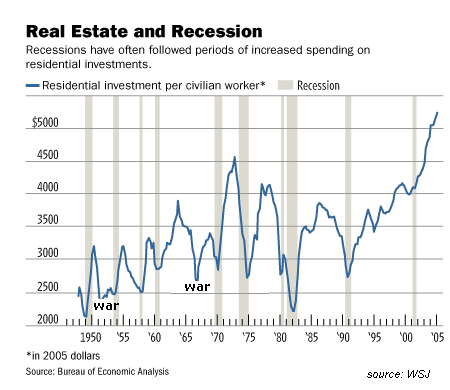 There's dirt under the fingernails of the housing market, but its slide down the
slippery slope is increasing in speed. Even though the apologists and pundits are
desperately digging their fingers into the steepening slope, trying to halt the
growing sense of panic, their efforts are not stopping the housing market's
slide toward the cliff of "asset deflation" and the subsequent dive in
housing-based consumer spending. Consider these clips and links:
There's dirt under the fingernails of the housing market, but its slide down the
slippery slope is increasing in speed. Even though the apologists and pundits are
desperately digging their fingers into the steepening slope, trying to halt the
growing sense of panic, their efforts are not stopping the housing market's
slide toward the cliff of "asset deflation" and the subsequent dive in
housing-based consumer spending. Consider these clips and links:
From the 12/25/05 column of Paul van Eeden: Earlier this month we learned that the inventory of homes for sale had reached the highest level in 19 years, and housing affordability was at a 14-year low. This week there is yet another article in the Wall Street Journal about housing affordability.To confirm the inventory story, here's the statistical source: Recent data from the research firm ISI shows that the dollar value of unsold homes in the U.S. has now surpassed $500 billion, up an unprecedented 33 percent from a year ago.And lastly, this quote from Alan Ableson of Barron's: Stephanie divines premonitions of a credit crash, triggered by a collapse in mortgage-backed securities. On the latter score, she points out that mortgage originators are securitizing low-quality loans as fast they can; subprime lenders are shedding jobs; and insiders in both the homebuliding and mortgage sectors "are quietly streaming through the exits." If such early tremors do, indeed, presage a serious quake, anyone leveraged to the hilt stacks up as a prime casualty. And leveraged to the hilt describes many a hedge fund perfectly.Still a believer in the housing market's invincibility? First, read all these stories, and then let's talk: investors retreat from housing (Wall Street Journal) Sacramento CA area housing weakness (Sacramento Bee) home sales down in Bellingham, Washington Chicago home sales down housing affordability lowest since 1991 (Wall Street Journal) new housing sales plummet (Yahoo News) The cliff is closer than many think, and the fall much farther than the standard-issue talking heads expect. December 27, 2005 Some Chinese Poems Yesterday's poem by American (dare I say Californian?) poet Robinson Jeffers on Nature's music brings to mind the Taoist poetics of China. To draw the parallels between Jeffers and the Taoists--but not too closely--here are several short poems for your consideration: Shih t'ao (1641 - 1717)And this one, as translated by my old professor at the University of Hawaii, Chang Chung-yuan, author of  Creativity and Taoism
:
Creativity and Taoism
:
The mind of man searches outward all day. December 26, 2005 An American Poem I received a special Christmas gift, a 1959 Random House edition of The Selected Poetry of Robinson Jeffers. Do yourself a favor right now and read this short poem, which expresses the uniquely American intensity he brought to his disdain for "civilization" and cities, and his Taoist-like sensitivity to the natural world of his chosen home, Big Sur: Natural Music  Like any great poem, there is much here to ponder and appreciate, images and
thoughts which fling off sparks in your mind, especially upon re-reading.
"Hungry-smitten cities," truly; and so of a piece with my own disdain for
our depraved comsumerist ideology. "Sick nations" needs no elucidation;
insert the countries of your choice. Nature's voice, "clean as a child's"--what
a wonderful auditory evocation--extended, at the last, to a young girl's dreams
of love. One would be hard-pressed to find a more exacting, moving expression
of so many powerful naturalistic themes. Perhaps in Chuang Tsu, but that's another entry.
Like any great poem, there is much here to ponder and appreciate, images and
thoughts which fling off sparks in your mind, especially upon re-reading.
"Hungry-smitten cities," truly; and so of a piece with my own disdain for
our depraved comsumerist ideology. "Sick nations" needs no elucidation;
insert the countries of your choice. Nature's voice, "clean as a child's"--what
a wonderful auditory evocation--extended, at the last, to a young girl's dreams
of love. One would be hard-pressed to find a more exacting, moving expression
of so many powerful naturalistic themes. Perhaps in Chuang Tsu, but that's another entry.
December 25, 2005 Merry Christmas Regardless of your beliefs and/or religious affiliations, if any, it's interesting to read about where Christianity really began: the miracles of Jesus. Merry Christmas to all! December 24, 2005 The Truth About Christmas: A Retailing Cancer Run Amok It has become banal to observe that Christmas is now commercialized to the point that the Devil himself is chuckling with delight. But this doesn't make it less true. So by all means, despite the banality, let's speak truth to power and state that Christmas has metastasized into a retail cancer in the body of American culture, a runaway expression of consumerism-as-the-true-religion.  Like the proverb about the frog which never jumps from the pot of hot water because
the temperature has increased so incrementally that the poor creature didn't notice, Americans are now being
boiled alive by a holiday which has increased their stress levels and financial
waste to degrees unknown to previous generations.
Like the proverb about the frog which never jumps from the pot of hot water because
the temperature has increased so incrementally that the poor creature didn't notice, Americans are now being
boiled alive by a holiday which has increased their stress levels and financial
waste to degrees unknown to previous generations.
Perhaps it will strain the credulity of younger readers, but my Mom fondly recalls getting an orange in her stocking in the Great Depression years. Yes, a common orange, shipped all the way from Florida or California to distant Kentucky, was a treat. Now, food is throw-away cheap, along with most of the clothing, gadgets and gewgaws people are desperately buying to fulfill their sacred duty to give unneeded gifts. Talk about inflation; when did it become standard practise to shower gifts on co-workers, customers, neighbors and relatives outside the immediate family? It was simpler in the 60s, I assure you, for the simple reason few had enough money to buy even small gifts for anyone outside the household. Then there's the inflation of "retail time" from late November all the way back to August. If this isn't evidence of a pervasive cultural sickness, then what qualifies? Yes, there are plenty of other qualifiers--horribly violent, sexually explicit video games, the pornographication of advertising, the routine obfuscation of the truth by government officials and agencies--but certainly the acceptance of a deeply ugly retail consumerism as the new Christmas "holiday" norm is a cancerous cultural malady. Is "cancerous" perhaps too strong, or an unsavory metaphor? As someone who has had a cancer surgically removed, I would call it apt. Like a cancer, this rampant consumerism has grown without the larger body even being aware of its destructive reach. Like cancer, it has stealthily tapped into the bloodstream of the economy, which is now dependent on the Christmas shopping frenzy for up to a third of annual retail sales. The real clincher for the disease metaphor, though, is the astonishing array of unhappinesses which the "holiday" causes. What emotions do you witness in your fellow citizens during this "holiday"? Rage, frustration, stress, over-indulgence in self-medications to combat the high stress levels--is this a "happy time"? Far from it. It's the season every adult has learned to dread with every fiber of their being, a stress-a-thon of epic proportions which costs far beyond a typical family's means. One other Depression-Era story. Fulfilling a great wish of his eldest son, my grandfather bought a bike for my uncle (my father's older brother) for Christmas. The bike was paid in weekly installments of $1. Remarkably--or perhaps not so remarkably--my Mom tells the same tale about her first bicycle and her Father's weekly payment of a single buck, back when a weekly wage might be $25. Now, a few generations later, Mom or Dad are popping hundreds or even thousands of dollars for idiotic game consoles, big-screen TVs and assorted poorly made junk which won't even last as long as the credit card bills. Oh, and by the way, that big ATM you live in, otherwise known as the family house? It's stopped rising in value, so you might not be able to re-finance it and bleed off another 20 grand in equity next year to pay for holidays, vacations, etc. So what's the solution? Easy, Just get off the merry-go-round. My good friend Steve Toma summed up the alternative very well: Call me scrooge, but outside of a few obligatory Christmas cards, I'm not participating this year and possibly forever. I mean when Christmas promotions start happening in June, something is definitely out of whack. I've had it with jazzed up versions of Christmas carols, and I'm fed up with "news" features of how commercialized Christmas has become. So, I'm actually having a stress free time...I guess that's one of the benefits of being a social misfit.Misfit? More like expressing a truly remarkable sanity. And when sanity makes you a misfit, then it's the culture which is misfit: deeply, terribly and apparently irredeemably misfit. December 23, 2005 The Kroika Mascot--"Auspicious Pet"  I was awakened by a call at 3 a.m. last night from the big cheese in the
Kroika marketing department (a time-zone confusion, alas, between Xiangxi and
the West Coast), suggesting that we we lay low on the "doom and gloom" theme, at
least until the Christmas shopping frenzy has run its course.
I was awakened by a call at 3 a.m. last night from the big cheese in the
Kroika marketing department (a time-zone confusion, alas, between Xiangxi and
the West Coast), suggesting that we we lay low on the "doom and gloom" theme, at
least until the Christmas shopping frenzy has run its course.
It seems doom and gloom sells, except during Christmas, when for obvious reasons lumps of bad-news coal are less welcome. The brilliant team at the Kroika marketing department came up with a substitute campaign based on the absolute rock-hard truth that Americans love their dogs. Indeed, nothing will drive an American to violence faster than insulting or threatening his or her dog. And so I finally have some marketing heft to compete with Chuckles and Freckles and Moby and Puppydog and all other heavy-hitting pets which attract millions of paying pet-loving eyeballs to various high-profile blogs. I fully expect our perky mascot to give Chuckles a run for his owners' money. I mean, c'mon, isn't this one cute mutt or what? So please give a round of applause to Kroika's wonderful Cairn Terrier, "Auspicious Pet." The name, as you can probably guess, comes right from the top management at Kroika; I told them it doesn't translate that well, but they were adamant about keeping it. Since they're paying big bucks to sponsor this site, I am stifling my dismay both at their choice of name and at the loss of face I'm suffering in publicizing "Auspicious Pet." Great dog, absolutely top-notch; if you love dogs (and you do, of course), then by strict logic you're going to love Kroika Cookies. 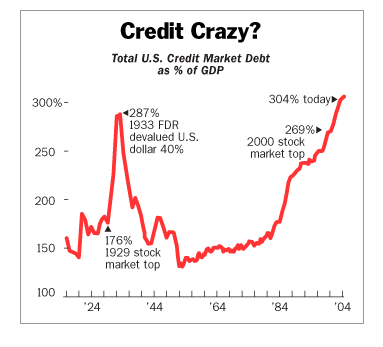 Speaking of Christmas, don't you wonder where everyone is getting all this dough
to blow on needless giftgiving? (It's not as if 90% of Americans don't
already own every possible device and comfort.) Take a look at this chart of skyrocketing
U.S. debt; gosh, maybe all this money is being borrowed. Do ya reckon?
Speaking of Christmas, don't you wonder where everyone is getting all this dough
to blow on needless giftgiving? (It's not as if 90% of Americans don't
already own every possible device and comfort.) Take a look at this chart of skyrocketing
U.S. debt; gosh, maybe all this money is being borrowed. Do ya reckon?
Doom and gloom may not sell, but unsustainable debt remains the core driver beneath the superficial lights of prosperity. But don't feel bad--have a cookie--a crisp, crunchy Kroika cookie. (We're working on some snappy marketing lines around here, and so far have come up with: "Go ahead, you deserve it! Eat the whole package at one sitting!") December 22, 2005 Doom and Gloom Sells 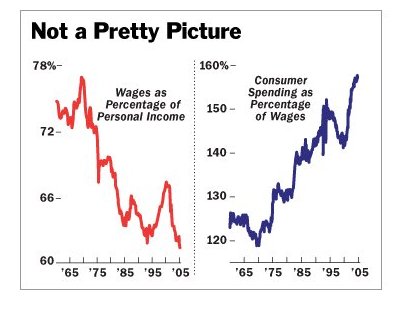 Those of you still wondering why the Kroika Cookie and Biscuit Company (KCBC) has
chosen to sponsor this modest blog, here's the reason: doom and gloom sells.
Those of you still wondering why the Kroika Cookie and Biscuit Company (KCBC) has
chosen to sponsor this modest blog, here's the reason: doom and gloom sells.
Even occasional readers of this site know that the global economic future is one shrouded in the deepest doom and gloom, for the current era of "prosperity" (as headlines cheerfully chirped today, "U.S. economy expands at best rate in two years--4.1%") is entirely bogus, depending as it does on three unsustainable, increasingly wobbly legs: unprecendented U.S. consumer borrowing and spending, and unprecedented buying of U.S. dollar-based debt by foreign central banks and other institutions. This foreign buying spree has effectively propped up the dollar and flooded the world with cheap liquidity (otherwise known as cheap-to-borrow money). The graph shows how rising spending is not coming from wages anymore--it's coming from borrowing. Being majority-owned by the People's Liberation Army, KCBC would not be sorry to see the U.S. economy go into a tailspin, as that would leave a happy vaccuum which China could then gracefully fill as the globe's next superpower. Alas, the PLA might have missed the linkage between the U.S. and Chinese economies, to wit, China is dependent on the U.S. consumer to buy about a third of their entire export output. So when the U.S. finally falls off the debt-deficit-overload cliff, the ropes firmly attached to the Chinese, Japanese and European economies ensure they will join the U.S. in the agonizing landing on the perilous rocks below. The PLA might also want to have a look at this article from a recent Atlantic Monthly magazine, The World Is Spiky. The charts in the story graphically demonstrate how population, energy use and patents (a rough proxy for innovation) are highly concentrated. While the population spikes in Asia, Europe and the coasts of the U.S. are to be expected, the PLA might want to look closely at the spikes in patents, which are concentrated in Tokyo, Seoul, and in the U.S. and Europe. Economic superpower status, it seems, is not just a function of population and physical size, but of innovation, which is a trickier thing to nurture and sustain than either production or consumption. (see Can you create creativity? in "Ideas" section of the sidebar on the left). For more Doom and Gloom, check the many topics listed under "Financial Meltdown Watch" in the sidebar. As for innovation, I must say that Kroika is leading the way in cookie technologies. Did you notice the light crusting of crunchy sugar topping on the Kroika cookie displayed in yesterday's entry? It collects just along the edges and against the embossed lettering. Yum! That requires a special high-tech technique which is winding its way through the patent application process, first in The Netherlands (thank you, Royal Dutch Comestibles Trading Company--Go Dutch!) and the E.U., and then in the U.S. That explains the barbed wire surrounding the Kroika factory and research labs, and the secretiveness of Kroika operations around the world. But you, lucky reader, have a window into this heavily guarded inner sanctum--yes, this very blog. December 21, 2005 This Blog Sells Out  It has long been a frustration that while other bloggers with a knack for
political diatribe or describing the antics of their cute mutt Chuckles are
raking in big bucks from Google ads and T-shirt and calendar sales, boasting of
a million visitors a month, this poor blog
with its mere 3,000 visitors a month generates absolutely no cash for its free-lance
author. Well, that's about to change. Yes, for the big bucks--a deal with China.
It has long been a frustration that while other bloggers with a knack for
political diatribe or describing the antics of their cute mutt Chuckles are
raking in big bucks from Google ads and T-shirt and calendar sales, boasting of
a million visitors a month, this poor blog
with its mere 3,000 visitors a month generates absolutely no cash for its free-lance
author. Well, that's about to change. Yes, for the big bucks--a deal with China.
Not China per se, but a Chinese firm, Kroika Cookie and Biscuit Company, KCBC for short. Truth be told, a little poking around leads me to suspect that KCBC is actually owned by the People's Liberation Army (PLA), which owns and operates a huge slew of legitimate firms in China--firms which are expanding globally despite their ownership by a Communist Army. Lest this sound unsavory, let me reassure you that the Western partner in the firm is a reputable corporation with roots tracing back to the 1700s--The Royal Dutch Comestibles Trading Company. Like all the other secretive multinational Dutch corporations, RDCTC gained its first profitable footing in the exploiting-your-colonies trade of the 1700s, exporting bat guano and the once-plentiful and now rare Sumatran Boatplug hardwood. Having lost control of the seas to the British Fleet, the Dutch contented themselves with growing exceedingly rich via immensely wealthy and under-the-radar trading companies like DRCTC. You may wonder why I am so free with criticism of my new sponsors. Actually, they want me to continue my skeptic's ways, as this will only build the credibility of their sponsorship. Devilishly clever, isn't it? Which explains why they picked my miserable little outpost on the Web as their foothold in America, rather than buying adspace on Chuckles' page, with its adorable banter about bratty kids, or "I hate (insert political figure or cause)" websites filled with mindless preaching to the choir: as obvious ads on blatantly commercial sites, they have no more credibility than, say, Pepperidge Farms. The Farm, and Mother's, and other heretofore invulnerable purveyors of cookies--fear the Mighty Kroika. You who have thought your cookie empires protected by distance and secret recipes (intellectual property)--ha! Kroika has tested its recipes on hundreds of thousands of unwilling soldiers, weeding out both the bad recipes and the insufficiently motivated soldiers in the process. With the persnickety Dutch in charge of quality--who knew the butter could be so good from Xiangxi?--Kroika Cookie and Biscuit Company is about to show those snooty Milano makers what a real cookie is like--tough, resourceful, imbued with the chi gained from long years of toil, yet soft as the yin in a baby's smile--behold the Kroika Cookie! OK, that was a little over the top. This first sponsorship check is just so huge, so astonishing, that I got carried away. I will return to the skeptical intellectualizing tomorrow. Remember the name: Kroika! December 20, 2005 Bumper Sticker Philosophy: There is no alternative to being yourself  Wisdom can pop up in the most unlikely places: consider this bumper sticker I saw
recently: "There is no alternative to being yourself." Sounds rather obvious,
doesn't it? But then why are we drawn to instant make-overs
and the allure of material transformation via worship at the many alters of
the the Shopping Gods?
Wisdom can pop up in the most unlikely places: consider this bumper sticker I saw
recently: "There is no alternative to being yourself." Sounds rather obvious,
doesn't it? But then why are we drawn to instant make-overs
and the allure of material transformation via worship at the many alters of
the the Shopping Gods?
It is, of course, an attractive illusion: that by buying some new material cloak--be it the fabric of clothing, the painted steel of a new vehicle, or the glittering gold of a new self-enhancing ornament--we become someone other than ourselves, someone better, more attractive, more worthy of respect or even adoration. The marketers rather naturally know this all too well. Thus the models accompanying the merchandise are svelt, sophisticated, worldly, or whatever image the product must project to fulfill the con; you, too, can become this powerful new being simply by purchasing this material good (or in the case of spas, etc., this temporal service). And now we are promised physical transformation. According to the Wall Street Journal of 12/15/05: It's part of the overall boom in the plastic-surgery business. Last year, 9.2 million cosmetic procedures were performed in the U.S., 24% more than in 2000, according to the American Society of Plastic Surgeons.No word yet on whether that fanny-tuck makes you a better person, a better lover, a worthier friend, or anything else of actual value. The painfully obvious answer is: it does not. At the same time that cosmetic surgery is growing by leaps and bounds, as the WSJ reported on 12/8/05, Americans Feel More Isolated, Less Empowered, Poll Shows. (free feature) So is the manic trend toward transforming our outward selves a pathetic, misdirected attempt to staunch a rising internal sense of isolation and powerlessness? I would suggest "yes." Too bad such external transformations never work any true magic. December 19, 2005 Is the Bloom Off the China Rose? 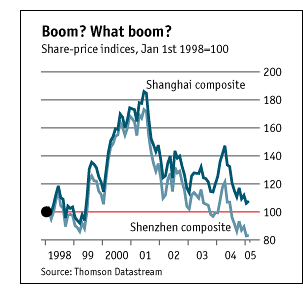 Although we're not wealthy in terms of money, we are wealthy in one valuable asset:
friends around the world. Friends tell you things you will never find in statistics or
most media stories. For instance, one of our Japanese friends visited us recently
with his new bride, and we were treated to an insider's view of doing business in
Vietnam and China.
Although we're not wealthy in terms of money, we are wealthy in one valuable asset:
friends around the world. Friends tell you things you will never find in statistics or
most media stories. For instance, one of our Japanese friends visited us recently
with his new bride, and we were treated to an insider's view of doing business in
Vietnam and China.
Like many small manufacturing companies in Japan, our friend's employer has parts (in this case, steel fittings, tubing, etc.) made in various other Asian countries: China, Vietnam and Thailand. According to our friend, Japanese companies are leaving China and returning to manufacturing in Japan, for two reasons: 1) the Chinese have a habit of shirking responsibility when things don't go right, and 2) theft of technology makes it a long-term impossibility to manufacture high-value items in China. Our friend reports that all hybrid vehicles are still made in Japan, as the manufacturers cannot risk losing the complex technology to the Chinese via theft. Although the quality of parts made in Vietnam is no higher than those fabricated in China, the difference in business attitude, he says, is enormous: unlike Chinese firms, Vietnamese factories will accept responsibility for missed deliveries, unacceptable quality and the like, and make good on their commitments. If theft of technology and the shirking of commitments made for quality and delivery are not just localized issues in China, but macro-issues to be found in every province and every type of business--and our other sources inside China give us no reason to doubt the widespread nature of these issues--then the bloom may well be off the "China will boom forever" rose. If the tide of foreign capital which flooded into China recedes in favor of the home country or other Asian nations, then China's growth will likewise recede. The chart above begs the question: if things are so great in China, how come the Chinese aren't buying shares in their own public companies? December 17, 2005 Three Snapshots of the U.S. Economy  The cliche is that a blind person's idea of an elephant depends on which part they
happen to touch. The same is true for the U.S. economy, on which the entire world
depends. A week or so ago my Mom dragged me to Union Square, the premiere shopping
district in San Francisco. (Funny how that phrase works just as well at 52 years of age as it did
at 14.) Yes, the lights on the tree (photo at right courtesy of Kayo Takano) set a
very pretty scene, and the hordes of shoppers jamming the sidewalks created
many opportunities for speculation.
The cliche is that a blind person's idea of an elephant depends on which part they
happen to touch. The same is true for the U.S. economy, on which the entire world
depends. A week or so ago my Mom dragged me to Union Square, the premiere shopping
district in San Francisco. (Funny how that phrase works just as well at 52 years of age as it did
at 14.) Yes, the lights on the tree (photo at right courtesy of Kayo Takano) set a
very pretty scene, and the hordes of shoppers jamming the sidewalks created
many opportunities for speculation.
For instance--where are all these people getting all this money to blow? As noted here before, personal savings rates have been negative for six months, meaning people are spending more than they earn, month after month. The Pollyannas in the crowd say this is no big deal because it doesn't take into consideration all the cash people are stowing in their 401K retirement accounts, which is a form of savings--but retirement funds are not the same as savings.  You don't cash in your retirement to pay for your kids' college,
or to pay for a vacation or Heaven forbid, for some medical expenses not covered by
your insurance. That's what savings are for, and Americans aren't saving diddly. If you
look at this graph which depicts the housing bubble that realtors claim doesn't exist
(gosh, that wouldn't be self-serving, would it?). Do you reckon people are counting on
their house always climbing in value, as it's done the past 5 years, to pay for everything
their little hearts desire, for ever and ever?
You don't cash in your retirement to pay for your kids' college,
or to pay for a vacation or Heaven forbid, for some medical expenses not covered by
your insurance. That's what savings are for, and Americans aren't saving diddly. If you
look at this graph which depicts the housing bubble that realtors claim doesn't exist
(gosh, that wouldn't be self-serving, would it?). Do you reckon people are counting on
their house always climbing in value, as it's done the past 5 years, to pay for everything
their little hearts desire, for ever and ever?
So the crowds of people squeezing through the aisles at Macy's suggests the elephant is roaring and strong; but touch another part--foreigners buying our debt--and the beast seems starved. The Foreign Security Purchases (NFSP) data from October showed that foreigners bought $106.8 Billion that month in dollar-denominated securities-- in other words, debt like bonds and Treasuries. At this clip, foreigners (at least those we can track) are snapping up $1.2 trillion in new debt every year. That's a lot of dough, and it suggests two things: 1) we're borrowing immense amounts of money from foreigners to sustain our Macy's easy-credit lifestyle, and 2) we are totally dependent on foreigners to keep buying all our debt because we save nothing ourselves. 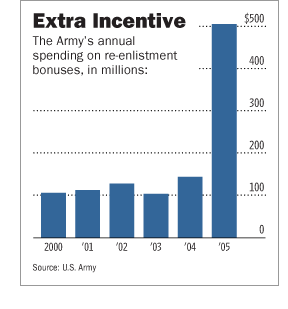 If you think this means the big, lumbering animal is healthy, well, then reach out
and touch what this graph depicts. What this chart is saying is that the Pentagon
is paying signing bonuses of $20,000 or more in order to get soldiers, Marines and sailors
to re-upp (re-enlist). Allow me to say what's too polite to say in public: guys are
signing up again, even though they may be killed or maimed, because they can't make this
kind of money in today's glorious economy. Yes, it's glorious if you're already rich, or
you own property on the Left or Right Coast; but if you're an average American living in
places without big-bucks opportunities, then $2,700 a month in pay, full medical and
housing benefits and over $500 in combat pay plus a 20 grand signing bonus start looking
pretty unbeatable.
If you think this means the big, lumbering animal is healthy, well, then reach out
and touch what this graph depicts. What this chart is saying is that the Pentagon
is paying signing bonuses of $20,000 or more in order to get soldiers, Marines and sailors
to re-upp (re-enlist). Allow me to say what's too polite to say in public: guys are
signing up again, even though they may be killed or maimed, because they can't make this
kind of money in today's glorious economy. Yes, it's glorious if you're already rich, or
you own property on the Left or Right Coast; but if you're an average American living in
places without big-bucks opportunities, then $2,700 a month in pay, full medical and
housing benefits and over $500 in combat pay plus a 20 grand signing bonus start looking
pretty unbeatable.
What does this say about our economy in terms of the average wage earner and family? That the real economy, not the credit-card one or the housing-bubble-refi one, is sick. December 16, 2005 Weekend Grab-Bag--How To Blow off Ads and More Don't you get tired of your Web browing experience being hijacked/ disrupted/ slowed by innumerable Flash (animated) advertisements and banner ads? Wouldn't you like to disable them? Here's how to do it, and it's free. For Windows PC users, go to Mike's Ad Blocking Hosts File and just click on the "download installer" button. Double-click on the installer after you've downloaded it and voila, ads are banished. (Note: this does not rid your computer of pop-up ads, but Windows XP Service Pack 2 has a built-in pop-up blocker, as does the Google taskbar, which you can get for free at Google.com. Both work well.) Here's how Mike's Hosts file works: This file is a very simple hack which takes ad server URLs and redirects them to non-existant numerical addresses. In other words we're fooling the internet. Its pretty simple and it works. Tens of thousands of people use it everyday with no problems.Don't you love this? You've just spoofed all the ad servers! Of course if the major ad vendors like Doubleclick add new server addresses, you'll need to add them to the hosts list. But you'll be amazed at how many ads disappear, and you didn't have to spend a dime on new "ad blocking" software. Note that it doesn't get rid of all ads but it certainly reduces the bandwidth hogging animated adverts. For Mac users, here's another site which tells you how to install the spoof/hack hosts lists on Linux, Mac and Windows machines: Web Ad Blocking. Basically, you copy a list of hosts off this site, save it as a text file and then place the file in /etc (Mac OSX) or in the "preferences" folders for Mac OS8 and 9. I wasn't sure which "preferences" folder to put the file in (the main one in the System Folder, or the nested one for I.E.?) so I did another search for help and came up with this site on editing Hosts files: Editing Hosts files which explains how to load your new spoofing Hosts file via TCP/IP. Maybe it's easier with Mac OSX but for the older versions this is a bit of a hassle but well worth it if you can get it to work. Here is another site with an explanation for older Macs Hosts files for the Macintosh. It's especially nice if you are working with a slow dial-up connection or an ancient (hence slow) machine like my Mac. There are a number of excellent recent articles on important topics often addressed here, and so for your reading pleasure this weekend, here are the links: On Iraq: From the Wall Street Journal: the story of a 31-year old American journalist who joins the Marines, for reasons which are essentially an American "blowback" to the brutality of the Iraqi and Afgani insurgents. Very well worth reading: Mightier Than the Pen. For those who don't know anyone who's actually in the U.S. Military, and who therefore don't know the high quality and motivation of our citizen-soldiers, this balanced, if not outright skeptical article from The Economist will be an eye-opener: Learning to Do Better: American Army Adapting to Conditions in Iraq. As I wrote earlier this week, if democracy has a chance in Iraq, it's due to the American citizen-soldiers on the ground, not the ham-handed administration in Washington. On the U.S. economy: Also from The Economist, a story on how the U.S. economy continues to chug along on the backs of its formidable consumers, even as it racks up frighteningly prodigious trade and Federal deficits: trade deficit, consumer spending On France's rioting woes: Again from The Economist, a report on France After the Riots: A month after the riots died down, France is still taking stock. In three weeks of violence across the country, some 10,000 vehicles were burned, 255 schools, 233 public buildings and 51 post offices were attacked, 140 public-transport vehicles were stoned, and 4,770 people were arrested, according to figures obtained by Le Monde. A report by the Renseignements Généraux, the police intelligence service, leaked to Le Parisien, concluded that the violence was neither orchestrated nor religious, but was rather a “popular revolt” linked to a “crying lack of integration”. It gave warning of possible fresh explosions on New Year's Eve, when hundreds of cars are torched even in normal years.On civil unrest in China: The Economist was hitting on all four cylinders: here's a story on heavy-handed repression of peasants protesting land grabs: China Unrest. It's the usual story of China: pervasive corruption, deadly force used to quell spontaneous, violent civilian rioting, Central Government worry that the nation is spinning further out of their centralized control. And last but not least, here's my latest helping hand to young writers: Dear Aspiring Writers: The Worst Advice You'll Ever Read. December 15, 2005 Quick--Which Country Is the World's Largest Exporter? 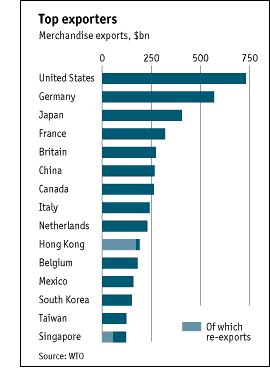 Which Country Is the world's largest exporter? China? Japan? Wrong. It's the good
old U.S. of A. Rather shocking, isn't it, considering all we hear about is how
our
trade deficit grows ever larger:
Which Country Is the world's largest exporter? China? Japan? Wrong. It's the good
old U.S. of A. Rather shocking, isn't it, considering all we hear about is how
our
trade deficit grows ever larger:
For October, imports of all goods and services rose by 2.7 percent to an all-time high of $176.4 billion, led by the surge in oil shipments. U.S. exports also rose but by a smaller 1.7 percent to $107.5 billion, reflecting in part a rebound in sales of commercial aircraft following the end of a strike at Boeing Co.The largest merchandise exporters (2004) as listed by NationMaster.com. (Note that the GDP dollar listed are derived from purchasing power parity (PPP): US Exports-Imports for 2004 from the Economic Policy Institute: Total U.S. imports last year were $1.764 trillion, 54% more than the $1.146 trillion in exports. To keep the trade deficit from widening, the growth rate of exports must exceed the growth rate of imports by 54%. Last year, import growth (16.3%) exceeded export growth (12.3%), and imports expanded by $247 billion, almost twice as much as the increase in exports of $126 billion.The ranked GDP of nations (the U.S. is by far the largest economy as measured by GDP) As with all statistics, you have to be careful to compare apples to apples. If you do, some interesting facts emerge. If you click on the first link above, you find that Germany outpaced the U.S. in merchandise exports in 2004, $893 billion to $795 billion. Yet total exports-imports as listed in the second quote indicate that U.S. exports were $1.146 trillion, not $795 billion. What gives? Well, the first graph and the first link are for merchandise exports only; but most nations also import and export services, such as financial and consulting services. When you combine goods and services, the U.S. is still the world's largest exporter. But why does the chart at the top right show the U.S. ahead of Germany even in merchandise? Simple. That graph is from 2001; in the past four years, German exports have grown far faster than U.S. exports of goods. Now take a look at the last link and compare Germany's economy to that of the U.S. It turns out Germany's GDP is only one-fifth that of the U.S.--meaning that Germany is heavily dependent on exports. Exports account for about a fourth of the German economy. As mentioned here in Meltdown in the E.U., this leaves Germany highly vulnerable to any slowdown in the global marketplace for its goods. In other words, if the world economy slows down, Germany will suffer an outsized decline, along with China and other nations dependent on exports for growth. Exports account for less than 10% of the U.S. economy, lessening the impact of a global slowdown. But no exporting nation will remain unscathed if the world economy slips on the banana peels of higher energy costs or the slowing of U.S. consumer spending. December 14, 2005 Important: Read These Three Links Whatever your politics, I think you will agree that there are few issues more important to the nation and the world than Iraq and Iraqi democracy. These three links are worth a few moments of your time. First up is a website which lists dozens of reputable non-profit organizations which are helping the people serving in the U.S. military and their families. Many focus on helping those wounded in the war. If you are adamantly against the war, please recall that the guys and gals serving in Iraq did not vote for the war--your Congress did. They are simply doing the duty they are sworn to perform. Give this site one minute and see how many typical Americans have founded these organizations; many were started by the women who manage them. You can do something as simple as send an email to someone serving, or donate frequent flyer miles (I did this, very easy and quick) or donate some cash via PayPal: America Supports You. I gave some cash because I look at it this way: though the administration blundered into Iraq and totally botched the postwar rebuilding process, the American military personnel on the ground have, agaist long odds, managed to clear the way for a nascent democracy to bloom in a very harsh and unforgiving environment. These citizens deserve our support. Most joined the military not for political reasons but because it was the only way they had to pay for college or escape an opportunity-poor environment. Next up is independent journalist Michael Yon's blog from Iraq. You have to read a few of his entries, just to prove to yourself you have an open mind. Many of his entries are heart-wrenching tales of bravery, but many are also heart-warming observations of flourishing normal life, especially in the Kurdish north. To say that the U.S. has done nothing positive in Iraq is simply not true from the Kurdish perspective. This is a guy on the ground, not controlled by any media or government agency. He deserves your respect and your eyes. Better yet, add him to your RSS/Atom reader list of feeds. Lastly, you should spend a few moments trying to understand the larger historical and cultural context of the Iraqi war. A good place to start is this interview with Bernard Lewis in today's Wall Street Journal. (You can always read it for free at your local library.) If you find yourself wanting to learn more, then I recommend this book by Lewis: What Went Wrong?: The Clash Between Islam and Modernity in the Middle East (To repeat a link posted on 12/11/05: For those interested in Islam in France, here is a link to an excellent essay on the subject, excerpted from the book Muslims in the West, from Sojourners to Citizens, 2002 Oxford University Press.) You can also check out previous entries on the topic, such as This is not Vietnam, National Purpose, National Sacrifice and others listed to the left under "Battle for the Soul of America." If you have found some value in this entry, please forward the URL to your Web contacts, groups and boards. December 13, 2005 The Decline of Europe: A Demographic Done Deal? At a dinner party a few years ago hosted by a close friend who happens to be Danish, the Europeans in attendance became visibly defensive when I raised the demographic specter of European decline. I wasn't trying to be "triumphant:" the U.S. and indeed most nations, developed and developing alike, face the same demogaphic problem: smaller workforces in each succeeding generation are being saddled with ever-more expensive benefits for their vast hordes of elders. 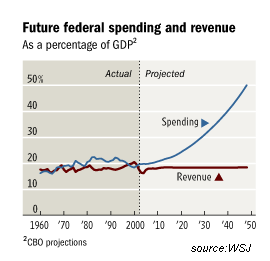 The problem for the U.S. is clearly visible in this chart to the right: the cost of
Medicare benefits for the Baby Boom will skyrocket while taxes (government income
needed to pay the benefits) flat-line due to the
shrinking worker base and the generous "tax cuts" awarded to the nation's wealthiest
citizens. (parentheses added to denote that "tax cuts" for the wealthy simply mean
their income is being subsidized by those with less political clout.)
The problem for the U.S. is clearly visible in this chart to the right: the cost of
Medicare benefits for the Baby Boom will skyrocket while taxes (government income
needed to pay the benefits) flat-line due to the
shrinking worker base and the generous "tax cuts" awarded to the nation's wealthiest
citizens. (parentheses added to denote that "tax cuts" for the wealthy simply mean
their income is being subsidized by those with less political clout.)
Even a schoolkid can see that this trend is unsustainable; benefits will have to be whacked down to what is affordable, or taxes will have to rise significantly. Everyone agrees cutting benefits is the way to go-- until they're the ones collecting the fat bennies. Then suddenly it's their "right." Hey pal, there are no "rights" to triple bypass surgery--there's only a social pact between generations. What struck me about the European's responses--one French biochemist even harumphed that demographics weren't very predictable--was the sense of denial implicit in their defensiveness. Yes, demographic trends are not entirely predictable, but we already know the cohort of French babies born today is not large enough to support the huge number of workers who will be retiring 20 years hence--that is already written in stone, and no sudden surge in French birth rates can change that. 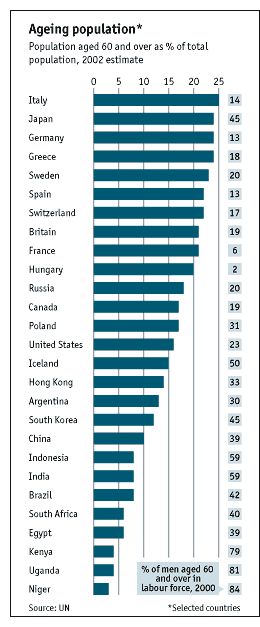 The European economies, already burdened by high taxes, drag along at low growth rates
and high unemployment. Raising taxes in the EU nations is simply not an option. So the
only option open is exactly what they don't want to hear--cut benefits, and by a lot.
The European economies, already burdened by high taxes, drag along at low growth rates
and high unemployment. Raising taxes in the EU nations is simply not an option. So the
only option open is exactly what they don't want to hear--cut benefits, and by a lot.
In contrast, most young Americans seem resigned to the fact that Social Security will be bankrupt before they ever get close to retiring. Perhaps they shouldn't be so fatalistic, but they certainly aren't in denial; they know the current transfer of wealth from one generation to the next is unsustainable. All this is laid out in easily digestible form in the book Fewer: How the New Demography of Depopulation Will Shape Our Future Indeed, it is clear that the "economic miracle" of postwar European expansion was a demographic anomaly: a massive influx of workers and their "baby boom" offspring created high ratios (and thus highly affordable ratios) of 9 workers for every retiree. The rich benefits the "Continental model" governments of Scandanavia and Northern Europe lavished on their retirees and unemployed were easily affordable as long as there were 10 workers' taxes being collected to pay for every retiree. But alas, now that great cohort of Baby Boomers is retiring, and leaving behind a smaller cadre of workers in their wake; now the ratio of worker to retiree has shrunk to 3-to-1, and in within the next decade or so it will shrink to an impossible-to-sustain 2-to-1. The nations with the richest benefits--that is, European nations--will be the ones least able to afford those benefits, as their birthrates have dropped well under replacement (2.1 babies per woman of child-rearing age). France and a few others have birthrates of 1.9 or so, and modest immigration will keep their numbers more or less stable or growing ever so slightly; the rest of Europe will see their number steadily decline. Articles such as this one titled Birthrate Decline Clouds Europe's Future are now common. Indeed, a C.I.A. report issued earlier this year stated: "The current EU welfare state is unsustainable and the lack of economic revitalization could lead to the splintering or, at worst, disintegration of the EU, undermining its ambitions to play a heavyweight international role," according to the forecast released in January.Here is a link to the full European Commission Green Paper titled "Confronting Demographic Change." Thanks to a birthrate close to replacement and high immigration--no triumphalism here, just the facts--the U.S. will continue to grow in population from 300 million today to 420 million or perhaps 450 million by 2050. This doesn't mean we will escape the overburdening of our sons and daughters with impossible-to-pay Medicare benefits for the 65 million Baby Boomers, but it does give us "wiggle room" the European nations simply don't have. By raising taxes modestly now, and cutting Medicare and Social Security benefits modestly now, we might just squeeze through the wormhole and avoid bankrupting our nation. Or then again, with a "tax-cuts are always good" fantasy ruling both the administration and Congress--the same folks who are too lilly-livered to actually cut benefits or raise retirement ages--maybe not. December 12, 2005 American French-Bashing Corresponent Christophe Coindy speculated rather reasonably whether the Iraq war-inspired "French-bashing" by Americans is actually more intense than the anti-Americanism to be found in France. Christophe pointed to websites such as f***france.com as evidence that the greater venom may well be found in America. As an observer of the American scene, I see the following issues in play regarding "French-bashing": (please note these are observations, not my personal beliefs) The "DeGaulle" rather famously took 11 years to build and cost more than the much larger and more capable U.S. carriers. As other pretenders to the "great power" throne have found ( to wit, India and China), an aircraft carrier makes a dandy "symbol" of military prestige--but if you don't have the battle group and complex communications network required to protect your carrier, then it is no more than a large, invitingly vulnerable target in a shooting war. The Chinese, for instance, are known to be counting on their large submarine fleet to sink U.S. carriers should war break out in the Taiwan Straights. Hopefully we will never have to find out if the U.S. has sufficient anti-submarine capabilities to counter this threat, but we can predict that the aspiring "great powers" (France, India and China) will be forced to keep their carriers safely in port should they actually engage in a naval shooting war; a few million-dollar torpedos or anti-ship missiles could disable their $4 billion "symbol" of power in short order. For the record, the U.S. Navy maintains 12 carrier groups; its chief aircraft carrier is the Nimitz class, 102,000 tons (the "DeGaulle" is 38,000 tons) with 72 aircraft of five types (strike, fighter, communications, suppression, anti-submarine); the "DeGaulle" carries 40 aircraft of three types. Not to belabor the point too much, but it is widely known in NATO circles that the E.U. nations are simply too poorly equipped to actually collaborate with the U.S. military on anything but routine "exercises." They lack the comm-links necessary to access the satellite, E-2, AWACS etc. network the U.S. depends on for battlefield intelligence and communication, and they do not own the transport needed to bring the vast "logistical tail" of a modern military to bear on any battle farther than their own shores. The EU nations have to hire Russian transport planes just to project their military forces beyond their own borders. Bottom line: if you can't actually project any military power beyond the horizon, then what good are all the expensive symbols of "military might"? Imagine, if you will, the U.S deciding not to respond when Saddam took Kuwait, and the E.U. saying, "This will not stand." Oh really? And what leverage would the E.U. have wielded against Saddam? Waving their fingers very sternly? As for the French seat on the U.N. Security Council, virtually the entire world views this as a Cold War anachronism; objective observers agree that the E.U. as a whole should have one seat, and the other members should be the other large powers: India, China, Russia and the U.S. In other words, the French have gone out of their way to not just decline support, but to actively counter U.S. policy, even when the impact on the French nation was minimal. That is, they had no pony in the show, but they tried to run the show nonetheless. Needless to say, this did not endear them to Americans. Such blatant hypocrisy is rarely endearing, no matter what the source. On these same lines, the huge contracts French and German companies had with Saddam's regime were not lost on Americans; indeed, it seemed rather obvious that French and German tolerance of Saddam's regime had a decidely commercial benefit. If that isn't hypocrisy, what is? France is also famously protective of its home markets and farm subsidies, yet it seeks at every turn to export its goods and services in a "free trade" setting. If that isn't mercantile hypocrisy, then what is? Americans are rather used to self-criticism; few Americans defend the injustices and imbalances so glaringly present in American society. They disagree only on the solutions. Thus, Americans quickly run out of patience with nations who appear to lack the same capacity for self-critique that we do, and for those who prefer to lecture us rather than themselves. Perhaps Americans view France as an especially prideful part of a Europe whose power and influence is in decline, a Europe which defines itself less by what it is for than by what it is against. Is this fair? Perhaps not, but the perception may have some truth in it nonetheless. December 11, 2005 Anti-American or Anti-French? My entry of December 9 on French anti-Americanism drew a very thoughtful and thought-provoking 3,480-word response from a widely traveled French citizen currently working in England, Christophe Coindy. (The link takes you to Christophe's blog.) I believe his comments are well worth reading: I would like to makes some comments about your last post. I am a Frenchman living in England. I have always been supportive of the US; I have worked for US companies and always enjoyed it. We have numerous American friends here in England. I have also lived most of my youth abroad; in fact like you (from what I understand in previous posts in your blog) my family is a mix; a mix between French from Europe (Caucasian) and Caribbean origins, mixing Chinese/Vietnamese, Amazonian Indian, and African blood.Christophe also took me to task for certain indulgences in hyperbole--he said he has seen minority mayors speaking on French TV, so it's simply not true that there are no minority mayors in France. He had a number of other questions about data and comparisons with the U.S.--all good points which highlight the long history and complexity of U.S.-French relations. (I have noted in a previous entry that the U.S. only won our War of Independence because the French fleet blockaded the British Army at Yorktown.) I must confess to failing one key journalistic requirement, which is to separate one's opinion from the source. I should have more clearly attributed "pathological hatred" to the source material, rather than allow the implication that such a view was my own. It is not. I also should have stated that I had no verifiable source for the data about French mayors. I have tried to find some information on minority representation of French elected officials, but without success--largely due to the fact that the French government does not collect data based on ethnic categories. Other numbers used in the entry are backed up by other sources: I used "10 million" as the total number of minority residents in France; Business Week sets the number of immigrants and their children at 9.8 million, or roughly 16% of the French population of 60 million. Although official statistics are not available by ethnicity, I found nothing to support the view that minorities in France are proportionately represented in government, either appointed or elected, i.e. that 16% of elected officials are immigrants or their offspring. Needless to say, the U.S. does not have a sterling record of minority representation, either, but certainly some progress has been made, especially at the city, county and state levels. Christophe went on to comment on other topics, but for now I would like to return to his excellent points about rabid anti-French sentiment in the U.S. Perhaps the real vehemence, he is suggesting, is in the other direction, a possibility I will explore in my next entry. (For those interested in Islam in France, here is a link to an excellent essay on the subject, excerpted from the book Muslims in the West, from Sojourners to Citizens, 2002 Oxford University Press.) December 10, 2005 On Hatred and Anti-Americanism, Part II  The French are not alone, of course, in projecting fears onto an
external enemy. Americans too have suffered from their own irrational
villifications based on fear: the shameful history of rabid anti-Communist
hysteria in the 50s or the many waves of anti-immigrant fervor are just two examples that
come to mind.
The French are not alone, of course, in projecting fears onto an
external enemy. Americans too have suffered from their own irrational
villifications based on fear: the shameful history of rabid anti-Communist
hysteria in the 50s or the many waves of anti-immigrant fervor are just two examples that
come to mind.
But France's obstructionist view of America has roots which seem to outlast typical cycles of externalized national insecurities. The review cited in yesterday's entry locates the start of France's outrage in America's 1794 peace treay with Britain, but certainly France's post-war flirtations with the Soviet Union and disgust with the U.S. has other more recent roots. The article cites two potential root causes: America's enormous sacrifices on France's behalf in the World Wars created debts which, being unpayable, have bred the natural resentment of the debtor; and secondly, that World War I so bled France that its people have since been unwilling to resort to armed force. Yes, the French put up a keen fight against the Nazis, but while the debacle of 1940 was undoubtedly based on the incompetence of political and military leaders, there was apparently a general air of defeat in the air long before the first shot was fired. This has been carefully described by William L. Shirer in The Collapse of the Third Republic: An Inquiry into the Fall of France in 1940 This unwillingness to use force even when there is reasonable cause--Shirer claims that the French Army, overwhelmingly superior to German forces in 1938, could have snuffed Nazism in a matter of days when Hitler made his first limited landgrab that year--has led the French, and indeed the E.U. as a whole, to a seemingly permanent reliance on diplomacy as the only tool available in international conflicts. This is all well and good when you're negotiating with other leaders of good faith, but when faced with a leader like Saddam or Stalin or Miloslavic who views negotiation solely as an opportunity to exploit the weak-willed and trusting--diplomacy has limited reach. Thus we have a France which appeared more tolerant or sympathetic to the Soviet Empire of Gulags and repression, Serbian hooligans, Castro's police state, Saddam's regime, etc.--than with American resolve. The ineffectiveness of their status only fuels their resentment of American power, it seems, for the willingness to maintain and use force gives the U.S. leverage the French or the E.U., with their limited militaries and staunch disavowal of force, will never wield. Even as ethnic cleansing, mass rape and murder were being committed by Serbians on the European continent, the Western European "powers" dithered and prevaricated, trying fruitlessly to "negotiate" with a leader who had every reason to exploit their weakness. Finally, the U.S. forced NATO into a pathetic, flaccid bombing "campaign" (two aircraft, four bombs) which only emboldened the Serbian perpetrators of genocide. At long last, as the innocent victims piled up in untold thousands like so much cordwood did the U.S. override the European fear of force and bomb the Serbian killers with the intent to break their will. Despite all the European handwringing and all the absurd limitations placed on NATO commanders, a few weeks of "bringing the war home" to the Serbians did in fact bring the Serbian genocidal reign of terror to an end--years later than circumstances warranted, and only after tens of thousands of unarmed civilians were slaughtered, raped and imprisoned. This is what the E.U. reliance on pure diplomacy wrought; the needless death of thousands. Thus we welcome a French reappraisal of that nation's views of America, along with a reappraisal of their own failures, limitations and weaknesses--problems which have been so graphically highlighted by the thousands of torched vehicles lighting the smoke-darkened skies of the Parisian Banlieus. December 9, 2005 On Hatred and Anti-Americanism "Sartre wrote that people who give in to the pleasures of hatred do so because they cannot abide their own frailties. Weakness and imperfection are the human condition. But weakness and imperfection leave us unsatisfied, maybe even disgusted with ourselves.  This is a quote from an article in The New Republic I highly recommend,
FRANCE'S FAILURES, HATREDS, AND SIGNS OF A NEW LOOK AT AMERICA:
The Anti-Anti-Americans by Paul Berman.
This is a quote from an article in The New Republic I highly recommend,
FRANCE'S FAILURES, HATREDS, AND SIGNS OF A NEW LOOK AT AMERICA:
The Anti-Anti-Americans by Paul Berman.
Berman reviews five new books on the long history of French anti-Americanism, which we find is embedded deep within French culture and history. We also find, via the Le discours de la haine (Discourses on Hatred) by André Glucksmann, that French anti-Americanism is, for all intents and purposes, a form of pathological hatred. By way of example, consider that books which claim the FBI, in cahoots with Jewish co-conspirators, is actually responsible for blowing up the Twin Towers on 9/11, are raging bestsellers in France, along with titles which giddily predict the utter collapse of American "Empire." I myself have heard average Frenchmen decrying the lack of democracy in the U.S. Speaking to my brother, who lives in the south of France, they shake their heads gravely and decry that all U.S. elections are rigged, Bush is worse than Hitler, etc. in tones which suggest they actually believe such absolute rubbish. Meanwhile, elections in France don't have to be rigged; there is not one minority mayor in the entire country, despite its vast minority population of Asians and North Africans. Speaking of the 9/11 destruction of the World Trade Center, one French commentator said, "Ultimately, they were the ones who did it, but we were the ones who wanted it." Can you imagine an American commentator blithely admitting to a hatred of France so great that the massacre of 3,000 French citizens would be cause for celebration? The source of such hatred is, as the quote suggests, a deep insecurity, a penetrating awareness of weakness and decline, and a visceral fear of the future. The irony is, of course, that the decline of America would not strengthen France at all; the breach would be filled by other less democratic powers, not by France. With 60 million citizens, 10 million of them restive minorities largely cut off from opportunities for advancement, 10% unemployment, an unaffordable social security network and a moribund economy, France is not exactly in an expansive, global-domineering mode. So much easier, as it is for other nations as well, to focus not on their own decline and structural impediments, but on hating America for its strengths. December 8, 2005 Huge Deficits and Huge Profits: Purely Coincidence?  Is it mere coincidence that the Federal deficit has grown by a staggering
$1.5 trillion 2002-2005, while in the same 4-year timespan U.S. corporations
have amassed a staggering $1.5 trillion in cash profits? I am not
suggesting that corporations' unprecedented wealth has come at the expense of
the taxpayer, but... corporate taxes are at
40-year lows as a percentage of GDP. Here's a report from the
Center for Corporate Policy which substantiates this troubling trend.
Is it mere coincidence that the Federal deficit has grown by a staggering
$1.5 trillion 2002-2005, while in the same 4-year timespan U.S. corporations
have amassed a staggering $1.5 trillion in cash profits? I am not
suggesting that corporations' unprecedented wealth has come at the expense of
the taxpayer, but... corporate taxes are at
40-year lows as a percentage of GDP. Here's a report from the
Center for Corporate Policy which substantiates this troubling trend.
More troubling, perhaps than the decline of corporate taxes is where all those corporate profits are going. As mentioned here in the December 2 entry, "The companies in the Standard & Poor's 500-stock index are on track to pay out more than $500 billion to shareholders in the form of dividends and share repurchases, or buybacks, according to S&P. That's up more than 30% from last year's record -- and equivalent to nearly $1,700 for every person in the U.S." Did you (via mutual funds or retirement holdings) rake in $1,700 from corporate America this year? (or $6,800 for a family of four.) I reckon not, as the top 1% of Americans own 36% of all the nation's wealth, and the top 10% own 71%. The ownership of stocks and bonds is even more skewed: Over 86 percent of the value of all stocks and mutual funds, including pensions, was held by the top 10 percent of households. In 1998, the top 1 percent of Americans owned 47.7 percent of all stock, while the bottom 80 percent owned 4.1 percent.So unless you're one of the top wealth-holders in the country, you probably didn't receive much of Corporate America's largesse. Next, think about where the $350 billion interest on Federal Debt which we taxpayers paid out this year went: to the holders of the bonds, of course. So in a sense, the enormous Federal deficit means that average taxpayers are subsidizing the wealthy owners of all the debt we're accumulating (both foreign and U.S. holders) because corporate taxes have gone down even as their profits have reached unprecedented heights. If that doesn't make you question U.S. tax policy a wee bit, then consider the facts: In the past 12 months, real per-capita disposable incomes are down 0.1%. At the same time, corporate profits are up 16.5%. Third quarter productivity was revised up more than expected to 4.7% (consensus was 4.5%). In other words, American workers are producing more for less wages at the same time corporate profits are growing by 15% year-over-year for the past fourteen quarters. If you are a skeptic--for isn't this "the stakeholder economy"?--then read this piece from the Wall Street Journal entitled Economy Grows, Wages Won't. Still think you live and work in a "stakeholder economy"? Better keep an eye on who owns the stakes. December 7, 2005 Education: Replacing the Factory With The Workshop  A few weeks ago I introduced the notion that our entire education system is based on
an outmoded "factory metaphor." The alternative, it seems to me, is a "workshop
metaphor," in which every child is seen less as a "manufactured education commodity"
and more of an individual resource which must be "hand-crafted" by the team of
student, teacher, administration and parents/guardians.
A few weeks ago I introduced the notion that our entire education system is based on
an outmoded "factory metaphor." The alternative, it seems to me, is a "workshop
metaphor," in which every child is seen less as a "manufactured education commodity"
and more of an individual resource which must be "hand-crafted" by the team of
student, teacher, administration and parents/guardians.
The factory metaphor, you will recall, is expressed in the size of the physical plant of typical, large urban intermediate and high schools, in the standardized criteria used to judge the "quality" of the "learning" inculcated by the "end product," i.e. a graduating student, and in the uniformity and the "production schedule" of the "one assembly line for all" education "process." One key insight into the "workshop metaphor" can be found in the book The Tipping Point: How Little Things Can Make a Big Difference The first and most obvious step toward a more effective education system, then, is to cut the number of students and teachers in each school (or school-within-a-school) to about 150. Such thinking is not new; the Bill and Melinda Gates Foundation, among others, is funding the establishment of small schools in Oakland, CA. Although there is no simple "magic bullet" to improving our educational system--we also need adequate buildings and recreational facilities, well-trained and professionally compensated teachers, accountable administration and involved parents--reducing the student body to the point that all the teachers and students can form bonds conducive to camaraderie or esprit de corps and mutual responsiblity is perhaps a key beginning. Another critical advance from the "production model" is the understanding that not all students learn alike or have equal talents. Standardized tests sound admirable, but such standardization makes no allowances for the enormous range of students' abilities and talents. The common sense approach of establishing flexible goals in test scoring is attracting some well-deserved interest. While teaching every child basic math, social studies and grammar is clearly essential, the drive to match Asian-style educations heavy on math and science could well be as misguided as the rush to emulate the Japanese Management Model in the 80s. Alas, it turned out the Japanese had less to teach us than we imagined about management, as their economy fell into a 15-year-long funk. If a kid is a wiz at desktop publishing and graphics, is force-feeding him or her higher math really productive? What about the more practical skills some students will need to become contractors, chefs or sales managers? A workshop metaphor recognizes the talents and limitations of every student, rather than attempting to manufacture a uniform "product." December 6, 2005 The Value of A True Friend  Dear Friend, I hope my friendship has enriched your life half as much as your
friendship has enriched mine.
Dear Friend, I hope my friendship has enriched your life half as much as your
friendship has enriched mine.
You are truly special, and I thank you with all my heart, arigato gozaimasu, for your gifts and especially for your friendship, which is worth more than any treasure. Every time I use your gifts, I will think of you, and miss you once more. Kayo ni matte niete ureshii desu. Honto! December 5, 2005 Sun Sets on Skeptics of Global Warming  With the release of data on 650,000 years of atmospheric carbon dioxide levels
extracted from Antarctic ice cores, the sun has finally set on those who claim current levels
of the greenhouse gas are merely natural fluctuations. As covered in
Scientific American and elsewhere,
the current CO-2 level of 380 parts per million is simply unprecedented.
With the release of data on 650,000 years of atmospheric carbon dioxide levels
extracted from Antarctic ice cores, the sun has finally set on those who claim current levels
of the greenhouse gas are merely natural fluctuations. As covered in
Scientific American and elsewhere,
the current CO-2 level of 380 parts per million is simply unprecedented.
"We have added another piece of information showing that the timescales on which humans have changed the composition of the atmosphere are extremely short compared to the natural time cycles of the climate system," says Thomas Stocker of the University of Bern in Switzerland, who led the research.Carbon dioxide levels have risen from approximately 220 PPM before the Industrial Revolution to 380 PPM today. The long-term effects of such high levels of CO-2 in the atmosphere are unknown, of course, but studies suggest global warming will be one inevitable result. In other environmental news, the Wall Street Journal reports that China's recent environmental woes stem from deeper weaknesses in the political system-- deficiencies covered in-depth here in China, An Interim Report. It's the usual suspects: weak central government oversight and industries serving the political needs of local government honchos and their big-bucks allies. One wonders how much of the glorious red in this Big Sur sunset drifted over from Red China: A recent U.S. study predicts that in the next decade as much as one third of the smog-forming nitrogen oxide emissions in California's air will come from China.South Korean researchers published a study last year showing that more than 40% of sulphur dioxide and other toxic pollutants in that country's air appeared to have originated from China. One difficulty has been that the State Environmental Protection Administration has only 200 professional employees as opposed to 10,000 that work for its counterpart in the U.S., the Environmental Protection Agency. Top Chinese officials are also making renewed calls on local provinces to rethink growth priorities that have allowed the construction of plants along river banks and in residential areas. But China's industrial engine has proven largely incapable of policing itself. Many of its biggest companies remain state-run, and many government agencies continue to play the role of both regulator and owner, leading to potential conflict of interests. So the San Francisco Bay Area's air and water quality agencies have far more staff than the entire EPA of China's central government? Is there any wonder why the policing and monitoring of China's vast pollution problems is so lax? As for the Central government calling on the provinces to shore up their environmental policies: That's akin to demanding the fox do a much better job of guarding the chicken coop. If you're a regional politico, who are you going to listen to: the big-shots in your own area who are building all the new factories and subdivisions putting your constituents to work, or some bureaucrat in Beijing telling you to develop policies and find the money to improve water and air quality? With 200 staffers, just how effective do you reckon the central government's oversight can be? December 3, 2005 PBS Pledge Week = Geezer Rock Overload It's PBS Pledge Week, and that means a solid week of oldie Rock shows. Best of Motown, Doo-Wop, The 60s Experience--Crikey! Are these the only programs which pull in pledges? Doesn't PBS have any viewers under the age of 50? Yes, I am 51, but frankly, I would gladly give our local PBS affiliate $50 to keep these same old tired shows off the air. I can hardly wait for the technology which will allow two PBS feeds, one for those who find the sight of plump, graying, balding folks standing up to jiggle their ample selves while mouthing the words to 40-year old songs absolutely entrancing, and another feed of the usual NOVA and Nature shows for those of us easily blackmailed into paying just to avoid the sight of aging rockers in grossly tight black jeans strain their vocal chords and other body parts to belt out a forgotten "anthem" or two. This is not to say I'm against nostalgia rock or geezer rock--I'm all for the truly classic stuff including the occasional retrospective like the Cream Reunion show. Anyone aspiring to play rock guitar improvisation solos will benefit from studying Clapton's techniques, timing, range and expression of emotion. Furthermore, a scan of the audience suggested a large percentage of the attendees were in their 20s or 30s--not at all the overwhelmingly Senior crowd visible in the Doo-Wop and "3 Dog Night"-filled nostalgia shows aired back-to-back, seemingly night after night. Others defend the right of rock greats to continue entertaining audiences with their old hits, just as Tony Bennett and B.B. King are welcomed and revered. Here is one solid defense of geezer rock. A glance at Sir Paul McCartney's recent playlist is impressive, ranging from ballads to "Helter Skelter," the original of which burns like few other rock songs ever. More troubling than the saturation of PBS airwaves by second-rate oldies shows is what that saturation says about the PBS viewer demographic. Are there no music programs with current artists available? If not, why doesn't PBS "Great Performances" schedule some showcases of new rock talent? The answer appears to be that few young people watch PBS anymore, and even fewer kick in cash during Pledge Weeks. So PBS is relying on aging Boomers to fund their operation, and apparently nothing opens the Boomer wallet like wallowing in musical nostalgia. December 2, 2005 Scrooge Reports In: Economy's Great? Bah Humbug  It's hard to know where to start, everything's going so great in the U.S. economy:
stock markets are hitting four-year highs, the cost of oil has dropped, consumer
sentiment is rising, housing prices and sales are still strong, interest rates are
historically low, consumers are still spending more than they earn...hey, wait
a minute. Is that good?
It's hard to know where to start, everything's going so great in the U.S. economy:
stock markets are hitting four-year highs, the cost of oil has dropped, consumer
sentiment is rising, housing prices and sales are still strong, interest rates are
historically low, consumers are still spending more than they earn...hey, wait
a minute. Is that good?
Scrooge is reporting in, and he says: Bah Humbug. Yes, the American consumer continues to spend more than he/she earns, as reported on Yahoo News: With incomes rising faster than spending, the personal savings rate improved to negative 0.7% from negative 0.8%. The record low was in August at negative 2.2%. The savings rate has been negative for six of the past seven months.Then there's the recent report from the Organisation for Economic Co-operation and Development (OECD) which outlines the rising imbalances and hence risk in the global economy: The OECD said oil prices and other imbalances, such as the U.S. current-account deficit, pose increasing risks. The deficit in the U.S. current account, which reflects the balance of trade and other payments, is projected to rise to a record 7% of gross domestic product in 2007.Then there's the weird and troubling phenomena of U.S. corporations not knowing what to do with all the $1.3 trillion in cash they've accumulated from 14 straight quarters of record profits. As reported in the Wall Street JOurnal,(paid registration required) this suggests they don't foresee any rosy prospects for future growth; otherwise, they'd be pouring all that dough into new ways to make more money instead of buying back their own stock: This year, the companies in the Standard & Poor's 500-stock index are on track to pay out more than $500 billion to shareholders in the form of dividends and share repurchases, or buybacks, according to S&P. That's up more than 30% from last year's record -- and equivalent to nearly $1,700 for every person in the U.S.Or not. The 14 quarters of double-digit profit growth is already a post-war record. With consumers spending money they don't even have, one wonders if Scrooge's assessment might not turn out to be prescient for 2006, if not for Christmas 2005. Since American consumers are spiking their eggnog with such heavy dollops of borrowing, the hangover is sure to be severe. In other news: Thank you, readers, from around the globe, for taking an interest in the offerings here. Unique visitors to the site are up from 619 last December to 3057 in November, hits went from 7294 to 40,805, pages visited climbed from 2640 to 12,125 and bandwidth useage rose ten-fold from 44 MB to 472 MB. A passel more folks stopped by, and I thank you kindly. December 1, 2005 Worried About Dollar Inflation? Just Stop Measuring It 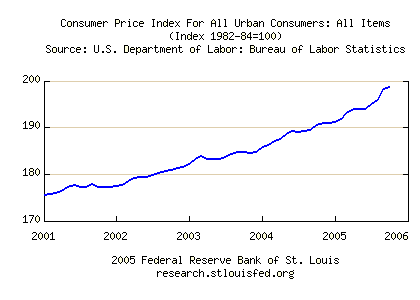 More than a few eyebrows arched in dismay when the Federal Reserve recently announced
that it would no longer calculate the broadest measurement of money supply in our economy,
M3: for example,
"Fed abandons M3 measure of money supply."
More than a few eyebrows arched in dismay when the Federal Reserve recently announced
that it would no longer calculate the broadest measurement of money supply in our economy,
M3: for example,
"Fed abandons M3 measure of money supply."
More than a few observers reckoned that the dismissal of M3 had less to do with the stated reasons--to save money in data-crunching and because M3 was judged to be inferior to M2--than the government's desire to obscure real US dollar inflation. To quote from the first linked article: here is the Fed's stated reason for dropping M3, and the writer's rsponse: "M3 does not appear to convey any additional information about economic activity that is not already embodied in the M2 aggregate. The role of M3 in the policy process has diminished greatly over time. Consequently, the costs of collecting the data and publishing M3 now appear to outweigh the benefits."As this chart reveals, inflation has been rising inexorably for the past two years; in response, the Fed has been inexorably clicking the Fed Funds interest rates up from 1% to 4%. If you glance at this chart posted on the Federal Reserve website, you'll note that 4% is historically still rather low; at the start of 2001, the rate was 6%; from 1994 through 2000, the rate was above 5%. Stock market pundits are nearly hyper-ventilating at the prospect that the Fed will stop raising interest rates, for such as move would vigorously goose stock prices. But if you look at this graph of inflation, and consider the recent historical average of about 5%, then you wonder if the pundits should reach for their tranquilizer of choice. For there is little reason for the Fed to stop raising rates, and a very critical reason to keep pushing them back to 5%--rip-roaring inflation. To quote Briefing.com's Nov. 30 afternoon summary: The November Chicago PMI report revealed that manufacturing trends remain strong, but the market perhaps focused upon the price-paid portion, which rose 18% and to its highest level in over 25 years.While it may well be that M3 measurement of money supply is no longer quite as accurate as it might be, wouldn't the prudent reaction be to tweak the data sources to improve the accuracy? It is more than suspicious that the Fed decides instead to ax the financial measurement which best captures the enormous expansion of money in our economy. wessay noun, combination of 'web' and 'essay,' denoting a short essay which exploits the hyperlinks, interfaces and interactive capabilities of the World Wide Web; coined by Charles Hugh Smith on May 1, 2005, in Berkeley California. copyright © 2005 Charles Hugh Smith. All rights reserved in all media. |
Subscribe via RSS: search my site: |
||
|
Our retail policy: Nothing is for sale except books/films I recommend (via links to Amazon.com) Free alternative: check them out at your local library |
home |